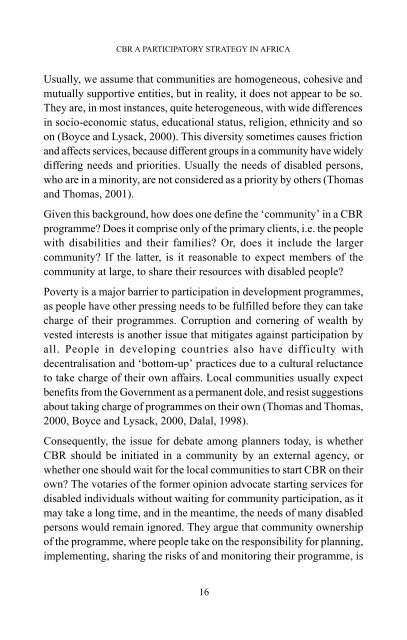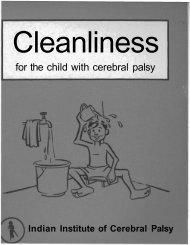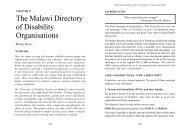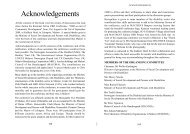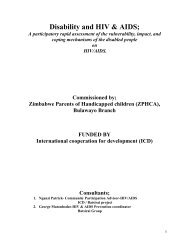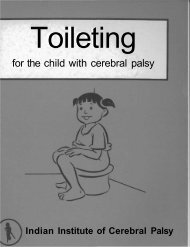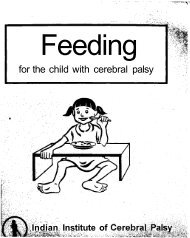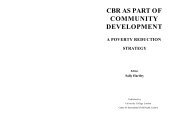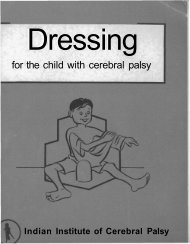Some Controversies in Community Based Rehabilitation - Source
Some Controversies in Community Based Rehabilitation - Source
Some Controversies in Community Based Rehabilitation - Source
Create successful ePaper yourself
Turn your PDF publications into a flip-book with our unique Google optimized e-Paper software.
CBR A PARTICIPATORY STRATEGY IN AFRICA<br />
Usually, we assume that communities are homogeneous, cohesive and<br />
mutually supportive entities, but <strong>in</strong> reality, it does not appear to be so.<br />
They are, <strong>in</strong> most <strong>in</strong>stances, quite heterogeneous, with wide differences<br />
<strong>in</strong> socio-economic status, educational status, religion, ethnicity and so<br />
on (Boyce and Lysack, 2000). This diversity sometimes causes friction<br />
and affects services, because different groups <strong>in</strong> a community have widely<br />
differ<strong>in</strong>g needs and priorities. Usually the needs of disabled persons,<br />
who are <strong>in</strong> a m<strong>in</strong>ority, are not considered as a priority by others (Thomas<br />
and Thomas, 2001).<br />
Given this background, how does one def<strong>in</strong>e the ‘community’ <strong>in</strong> a CBR<br />
programme Does it comprise only of the primary clients, i.e. the people<br />
with disabilities and their families Or, does it <strong>in</strong>clude the larger<br />
community If the latter, is it reasonable to expect members of the<br />
community at large, to share their resources with disabled people<br />
Poverty is a major barrier to participation <strong>in</strong> development programmes,<br />
as people have other press<strong>in</strong>g needs to be fulfilled before they can take<br />
charge of their programmes. Corruption and corner<strong>in</strong>g of wealth by<br />
vested <strong>in</strong>terests is another issue that mitigates aga<strong>in</strong>st participation by<br />
all. People <strong>in</strong> develop<strong>in</strong>g countries also have difficulty with<br />
decentralisation and ‘bottom-up’ practices due to a cultural reluctance<br />
to take charge of their own affairs. Local communities usually expect<br />
benefits from the Government as a permanent dole, and resist suggestions<br />
about tak<strong>in</strong>g charge of programmes on their own (Thomas and Thomas,<br />
2000, Boyce and Lysack, 2000, Dalal, 1998).<br />
Consequently, the issue for debate among planners today, is whether<br />
CBR should be <strong>in</strong>itiated <strong>in</strong> a community by an external agency, or<br />
whether one should wait for the local communities to start CBR on their<br />
own The votaries of the former op<strong>in</strong>ion advocate start<strong>in</strong>g services for<br />
disabled <strong>in</strong>dividuals without wait<strong>in</strong>g for community participation, as it<br />
may take a long time, and <strong>in</strong> the meantime, the needs of many disabled<br />
persons would rema<strong>in</strong> ignored. They argue that community ownership<br />
of the programme, where people take on the responsibility for plann<strong>in</strong>g,<br />
implement<strong>in</strong>g, shar<strong>in</strong>g the risks of and monitor<strong>in</strong>g their programme, is<br />
16


